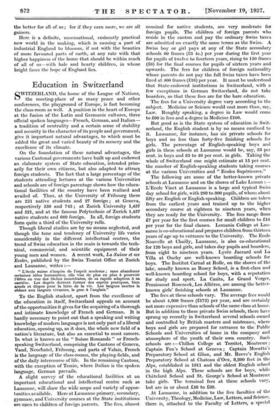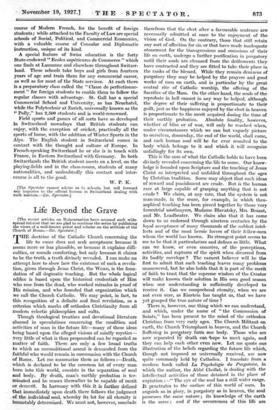Education in Switzerland
SWITZERLAND, the home of the League of Nations, the meeting-place of so many peace and other conferences, the playground of Europe, is fast becoming the class-room as well. A position in the heart of Europe at the fusion of the Latin and Germanic cultures, three official spoken languages—French, German, and Italian- s tradition of neutrality and a certain sense of stability and security in the character of its people and government, give it important natural advantages, to which must be an added the great and varied beauty of its scenery and the excellence of its climate. On the foundation of these natural advantages, the various Cantonal governments have built up and endowed an elaborate system of State education, intended prim- arily for their own citizens, but also adapted to attract foreign students. The fact that a large percentage of the students attending lectures at the various Universities and schools are of foreign parentage shows how the educa- tional facilities of the country have been realized and availed of. Thus, at the University of Fribourg there are 251 native students and 27 foreign ; at Geneva, respectively 550 and 745 ; at Zurich University 1,457 and 521, and at the famous Polytechnic of Zurich 1,457 native students and 669 foreign. In all, foreign students form quite a third of the University rolls. Though liberal studies are by no means neglected, and though the tone and tendency of University life varies considerably in the different intellectual centres, the trend of Swiss education in the main is towards the tech- nical, commercial, and scientific equipment of their young men and women. A recent work, La Suisse et ses Ecoles, published by the Swiss Tourist Office at Zurich and Lausanne, writes
L'ecole suisse s'inspire de l'esprit modern ; sans abandoner certaines idees humanistes, elle vise de plus en plus a pourvoir relOve en vue des tfiches immediates, de sa rapide adaption a sa carriere. Les degree doivent former des esprits pratiques, bien armee at dispos pour la lutte de in vie. Les leagues mortes to cadent aux Longues vivantes, is grec a ranglais."
To the English student, apart from the excellence of the education in itself, Switzerland appeals on account of the opportunities it gives for the acquiring of a thorough and intimate knowledge of French and German. It is hardly necessary to point out that a speaking and writing knowledge of modern languages is not only part of a liberal education, opening up, as it does, the whole new field of a nation's literature, but also an essential to most careers. In what is known as the " Suisse Romande " or French- speaking Switzerland, comprising the Cantons of Geneva, Vaud, Neuchatel, Fribourg, and parts of Valais, French is the language of the class-rooms, the playing-fields, and of the daily intercourse of life. In the remaining Cantons, with the exception of Tessin, where Italian is the spoken language, German prevails. A slight survey of the educational facilities at an important educational and intellectual centre such as Lausanne, will show the wide scope and variety of oppor- tunities available. Here at Lausanne primary, secondary, gymnase, and courses at the State institutions are open to children of foreign parents. The fees, almost nominal for native students, are very moderate for foreign pupils. The children of foreign parents who reside in the canton and pay the ordinary Swiss taxes are admitted on exactly the same terms as the Swiss. A Swiss boy or girl pays at any of the State secondary schools 80 francs (£3 4s.) per year during the first year for pupils of twelve to fourteen years, rising to 150 francs (£6) for the final courses for pupils of sixteen years and upwards. The fees for children of foreign nationality whose parents do not pay the full Swiss taxes have been fixed at 400 francs (£16) per year. It must be understood that State-endowed institutions in Switzerland, with a few exceptions in German Switzerland, do not take boarders, so that these fees are for the bare education. The fees for a University degree vary according to the subject. Medicine or Science would cost more than, say, Law. Roughly speaking, a degree in Law would come to £60 in fees and a degree in Medicine £100. But good as is the State system of education in Swit- zerland, the English student is by no means confined to it. Lausanne, for instance, has six private schools for boys and no less than forty-five finishing schools for girls. The percentage of English-speaking boys and girls in these schools at Lausanne would be, say, 33 per cent. in boys and 35 to 40 per cent. in girls. Taking the whole of Switzerland one might estimate at 15 per cent. the number of English-speaking students taking courses at the various Universities and " Ecoles Superieures." The following are some of the better-known private schools at Lausanne and on the shores of Lake Leman :— L'Ecole Vinet at Lausanne is a large and typical Swiss day school for girls, with 280 to MO pupils, of whom about fifty are English or English-speaking. Children are taken from the earliest years and trained up to the higher secondary course at eighteen to nineteen years, when they are ready for the University. The fees range from £7 per year for the first courses for small children to £16 per year for the final classes. Lemania College at Lau- sanne is co-educational and prepares children from thirteen years of age up to entrance to the University. The Ecolc Nouvelle at Chailly, Lausanne, is also co-educational for 120 boys and girls, and takes day pupils and boarders, from eight to nineteen years. Lycee Jaccard and La Villa at Ouchy are well-known boarding schools for boys. The Institut Carnal at Rolle, on the shores of the lake, usually known as Rosey School, is a first-class and well-known boarding school for boys, with a reputation for study and sport. La Casita, Le Grand Verger, Pensionnat Roseneck, Les Allieres, are among the better- known girls' finishing schools at Lausanne. The fees at these schools vary. The average fees would be about 4,300 'francs (1172) per year, and are certainly not more expensive than schools of the same class at home. But in addition to these private Swiss schools, there have sprung up recently in Switzerland several schools owned and controlled by British masters and mistresses, where an boys and girls are prepared for entrance to the Public Schools and Universities of home in the company and atmosphere of the youth of their own country. Such schools are :—Chillon College at Territet, Montreux ; Captain Fox's School at Geneva ; Captain Mocatta's Preparatory School at Glion, and Mr. Reeve's English Preparatory School at Chateau d'Oex, 8,200 feet in the an Alps, established in 1911 and the oldest English school in the high Alps. These schools are for boys, while Chatelard School and St.: George's School at Montreux take girls. The terminal fees at these schools vary, but are in or about £40 to £60. At Lausanne, in addition to the five faculties of the University, Theology, Medicine, Law, Letters, and Science, 'there is, -attached to the Faculty of Letters, a special course of Modern French, for the benefit of foreign students ; while attached to the Faculty of Law are special schools of Social, Political, - and Commercial Economics, with a valuable course of Consular and Diplomatic instruction, unique of its kind.
A special feature of Swiss education is the forty state-endowed " Ecoles superieures de Commerce " which one finds at Lausanne and elsewhere throughout Switzer- land. These schools take boys and girls from fourteen years of age and train them for any commercial career, as well as for most of the State services. At each there is a preparatory class called the " Classe de perfectionne- ment " for foreign students to enable them to follow the regular classes with advantage. St. Gall has a special Commercial School and University, as has Neuchatel, while the Polytechnic at Zurich, universally known as the "Polly," has 2,500 students and is world-renowned.
Field sports and games of all sorts have so developed in Switzerland nowadays that British students can enjoy, with the exception of cricket, practically all the sports of home, with the addition of Winter Sports in the Alps. The English student in Switzerland comes in contact with the thought and culture of Europe. In French-speaking Switzerland he or she is in touch with France, in Eastern Switzerland with Germany. In both Switzerlands the British student meets on a level, on the playing-fields and in the class-rooms, students of many nationalities, and undoubtedly this contact and inter- course is all to the good.
W. P. K.
[The Spectator cannot advise as to schools, but will forward any inquiries to the official bureau in Switzerland dealing with such matters.—En. Spectator.]















































 Previous page
Previous page